Below is a list of volunteers who have this experience and are here to provide you with support and advice.
For more information or to get in touch with someone please email supportvolunteers@musculardystrophyuk.org.
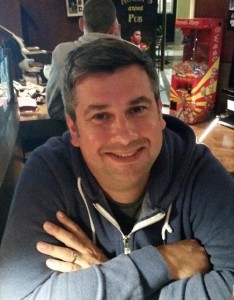
Anthony Roberts, from Stockport
About me: I’m an Engineer who now works in staff training and I have limb girdle muscular dystrophy. I enjoy socializing, watching TV box sets, going on local walks, and I love my gadgets
Why I became a peer support volunteer: I would have liked to have been offered help and advice from someone that had been through a similar experience as I have when I was diagnosed
Top Tip: Keep doing as much as you can for as long as you can. But don’t overdo it! People are always willing to help if you just ask.
Fun Fact: I’m so forgetful that my wife calls me Dory from Finding Nemo.
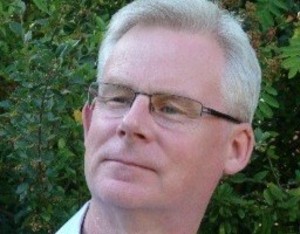
Bryan Gould, from Stourbridge
Hobbies/interests: I enjoy watching live music with my two grown-up sons and my family are Villa fans through thick & thin! My wife Catherine and I enjoy holidaying and holding themed dinner evenings with our friends.
Why I became a peer support volunteer: With first-hand experience of living with OPMD, a rare muscular dystrophy, I would like to support others with the complexities of obtaining diagnosis as well as the potential for misdiagnosis and interacting with healthcare professionals who often have limited or no knowledge of neuromuscular conditions.
Top tip: Only set yourself realistic goals and ensure there is built in “me time”. Don’t be afraid to accept the support of others particularly family and close friends.
Fun fact: I once sang Christmas carols with the Led Zeppelin front man Robert Plant. He thought our “fundraising carols” needed vocal support when we turned up outside his local pub.
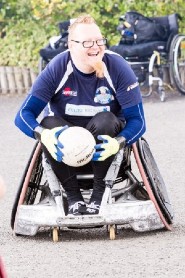
David Davidson, from Glasgow
About me: I was diagnosed with LGMD2B in 2015 after many years of misdiagnosis and I have been a full time wheelchair user for the past year and half. I play wheelchair rugby with the Caledonian Crushers and in January 2015 I became the assistant coach and also a player with the Glasgow Panthers Rugby League club.
Hobbies / Interests I have also started doing rowing for more fitness and we’ll see where that takes me in the future. I also enjoy cooking and taking my two dogs for walks.
Why I became a peer support volunteer: I had no support after my diagnosis 10 years ago and I found that really hard. I want to be there for newly diagnosed people and their families to give them someone to talk to. I feel like I have something to offer in helping people as I’ve been there too.
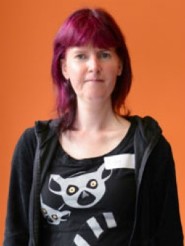
Elly Miller, from Stockport
About me: My interests are animals, wildlife and photography. I support and sponsor animals in a number of rescue centres, and visit with my camera as often as I can. I also enjoy live music and go to gigs and festivals throughout the year.
Why I became a peer support volunteer: I want to become a peer support volunteer to help others at the time of diagnosis.I felt quite isolated, when I was diagnosed with congenital myopathy, and would have benefited from having someone to talk to who had been through a similar experience. I’m also aware that getting a diagnosis can be a lengthy and frustrating process, and sometimes we don’t get a definite answer.
Top Tip: Be creative, if you feel you can’t do something, try to think of a way of doing something differently to achieve the same goal.
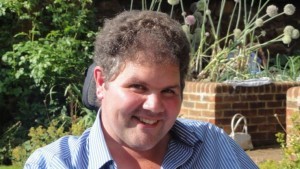
Richard Miller-Smith, from Oxted
About me: Now into my 40s, I live in Surrey with my wife, daughter and son. I have a passion for all things science and nature, and enjoy getting out into the countryside whenever possible. I run my own business in electronics and software design.
Why I became a peer support volunteer: When I was diagnosed with a rare form of muscular dystrophy there were many worries and open questions that it was hard for healthcare professionals to answer. I was helped through some of these by my elder brother who also has muscular dystrophy, and I, in turn, would like to help others.
Top tip: It can be harder than it sounds, but never be shy to ask for help with physical tasks. A lot of frustration can be built up and energy wasted pushing your physical limits. Instead, a moment of embarrassment asking a family member, friend, or even a stranger quickly passes.
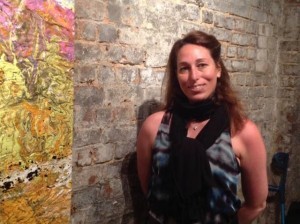
Romina Puma, from London
Hobbies/interests: My main hobby is stand-up comedy and I talk about my condition on stage. I hope to spread a bit of awareness and knowledge about this rare condition.
Why I became a peer support volunteer: I became a peer support volunteer because I hope that through my experience I can help people to deal with this condition especially in the first stage when they just discover they have it and transfer my positivity.
Top tip: Find a way to do things – do not let the condition stop you living a “normal” life!
